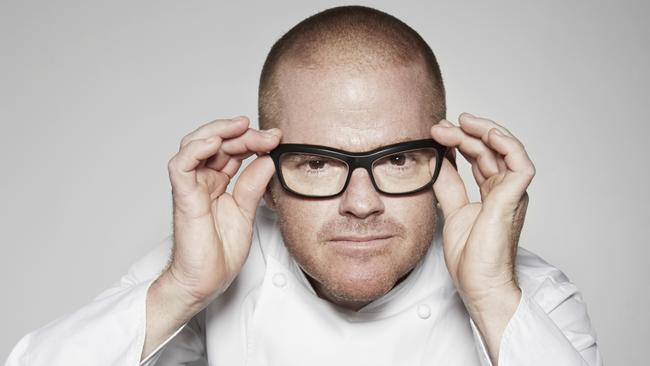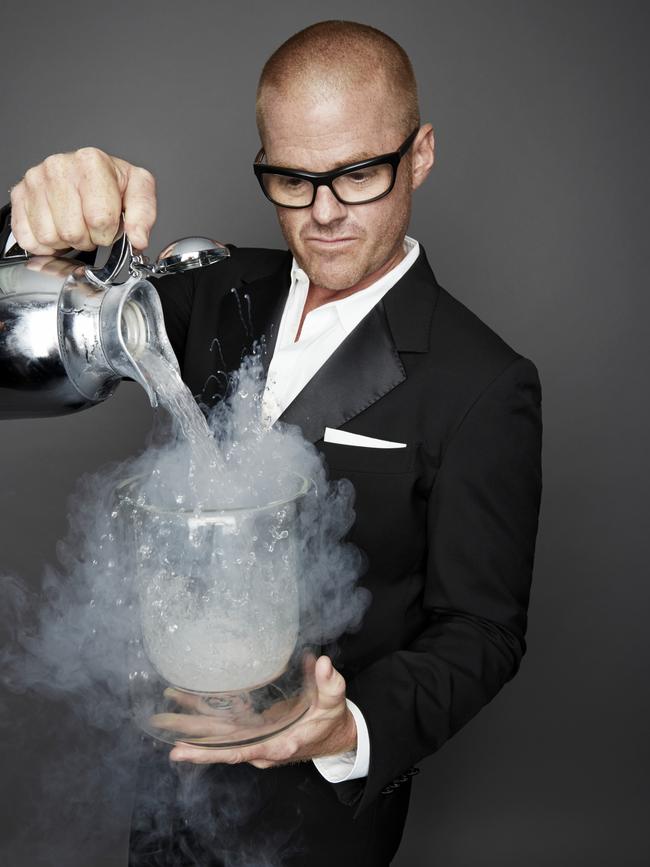Heston’s human element
After a long break, British celebrity chef Heston Blumenthal is back. And he’s hungry and brimming with ideas.

He has been called a nutty professor. And a genius.
Those who saw Heston Blumenthal’s appearance on Network Ten’s The Project two years ago — a bizarre stream of consciousness that had panellists and viewers scratching their collective head and muttering “What the …?” — probably would steer towards the former.
Those who have read his books, watched his television shows and eaten in his restaurants possibly would lean towards the latter.
The truth is probably somewhere between or a little of both. A conversation with the British chef, who has spent an awful lot of time in Australia during the past 10 years, leaves a residual halo of confusion and awe in equal measure.
The diagnosed ADHD sufferer is on another plane to most of us. Blumenthal is … different.
“In about a month’s time we will have another lab down there (in Provence, where Blumenthal now lives) which is based on water,” he tells The Australian. “There’s increasingly strong research that tells us water has a memory. Water holds data and as our body is 60 to 90 per cent water it’s really important.”
And later: “I’ve come full circle, I’m back in the place where I started. It’s like falling down a rabbit hole into my own wonderland. Once I’ve finished the process of stepping back into the fray I’ll start implementing my ideas. My ideas are literally haemorrhaging. It’s so exciting.”

Yes, Blumenthal is back. Not just in Australia, where he visited in March for the Grand Prix, MasterChef and to do some work in his Melbourne restaurant, Dinner, but back metaphorically from a self-imposed period of reflection and introspection in France, where he is based with his newish wife, Stephanie Gouveia, and their fairly new baby, Shea.
Seems the merry-go-round of fame, business, divorce and constant travel finally took a toll on the once omnipresent owner of the Fat Duck. Time away from it all was the answer.
“I was quite intentional in moving away from the time I spent promoting,” he says, the irony of his words — he’s doing press interviews, after all — undoubtedly not lost.
“I didn’t want to feel like a hamster on a wheel. It’s sort of self-perpetuating — the more it grows, the more I have to do to bring more money in to make it grow, and I have to bring in more people to support the growth, and I’ve got to spin fast on the wheel. I wanted to cut back on that so I could get back to concentrating on what I love doing.”
It all makes sense, so far. From plum puddings for Coles, barbecues for Everdure, electrical products for Sage (Breville in Europe) and an almost constant stream of publishing and television projects, Blumenthal had gone from the snail porridge guy to a household name around the world in 15 quick years.
No wonder he needed a break.
“So, the last 18 months to two years I’ve restructured the company in the way the developments work, and I’ve done a lot of work on evolution and what makes us human; and, in fact, hunting, gathering, cooking and then eating the food that we cooked for survival and social purposes is a uniquely human thing — that’s actually what makes us human.”
Please continue, Heston.
“That’s been the thread that’s running through all the research I’m doing, and it ties in with cosmology, mineralogy, physics and storytelling. We’ve become the most powerful species on the planet and we were able to do that because we could work in increasingly large numbers because we had creative thinking and shared belief.
“Money and human invention of time is a shared belief, and that’s what I call human ‘doing’ rather than human ‘being’.”
Blumenthal’s respite period has involved a lot of reading and research.
“So now I’m stepping back into the fold and it feels like the last 20-plus years of my career I’ve been laying the foundation,” he says. “I wasn’t thinking that while I had my head down.
“I feel like I now have the basis and now I have more motivation and excitement than I’ve ever had before, and now I’ve just got to convey that to the others (in his company) without scaring the living daylights out of them, because there’s so many possibilities.”
As Blumenthal has proven through most of his career, he thinks about the acts of creating food, and consuming it, in ways quite different to the rest of mankind. Remember Sound of the Sea, the seafood dish that comes with a conch shell and earphones?
“I read an interesting article in The New Scientist that said interruption is a malady of modern human life because we’re continuously being distracted and interrupted by stuff,” Blumenthal says, warming to the subject.
“Where I am in France, the mobile reception in certain spots is terrible, and what started off as being really frustrating became a blessing in disguise because Plato had this thing called etiology where we have our subjective and objective universe. Our objective universe is rivers and trees and all the stuff that was there before us, and then there’s our human creative objective universe, which is all the mobile phones and technology and houses and cars.
“Then we have our subjective universe, which is the relationship we have with the objects.
“We always think the things outside our body will make us happy — a new car, a new house, a new family — but if we haven’t got our relationships with ourselves sorted out, we put hope in these objects that we want, and then when it doesn’t work we blame them. So we’re continuously taking ourselves away from ourselves.”
How, I wonder, is this new understanding going to manifest itself in terms of creative output?
“We want to invoke the positive side of nostalgia,” he says. “There’s several techniques but I can’t give it all away yet, it’s been a lot of work. It’s a mixture of things, but one of them is a wizard’s cupboard where one of the front-of-house staff — who are actually now trained storytellers — might be chatting and responding to a reaction from a customer.
“It might be: ‘Table three love this so go and get the lizard or the Mars bar from the cupboard’. It will be things we already have; then there’ll be things we can make for them (and) if a person makes a booking then they can give us some information that helps.
“I also want to engage the diner in the development process so they can become a storyteller at the dining table. It’s ambitious but hopefully it’s transferring from something that’s been a cloud to a structure and strategy that is woven into the dining process.”
We’ll have to wait for the press release to explain exactly how this will manifest at the Fat Duck or indeed the spin-off restaurants Blumenthal is planning. They’ll be called the Fat Ducklings — “simplified versions based on the same principles”.
It’s probably not for Dinner, be it Melbourne, London or the third such restaurant, due to open in Dubai this year.
Blumenthal has a beyond-business relationship with James Packer and Crown executive chairman John Alexander, but he says so far a rumoured Dinner for Sydney is simply that.
“I haven’t got any concrete plans for Sydney (but) if the opportunity arose and the timing was right, it would be a great thing to do,” he says. For now, Blumenthal wants to focus on the literal plate, not the metaphorical one with too much on it.
“Eating is the only thing we need to do consciously to survive but we’ve taken it for granted,” he says as I wind up the conversation, and not at the first attempt, either.
“If we could just value food and value the story behind it, all of a sudden our food becomes so much more. We need to value it more.”
Blumenthal’s back, and he’s hungry.

To join the conversation, please log in. Don't have an account? Register
Join the conversation, you are commenting as Logout